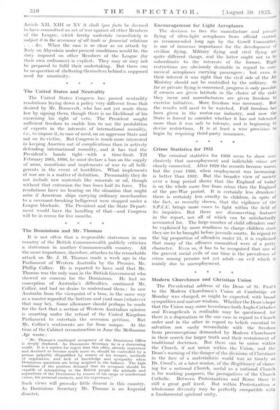The United States and Neutrality The United States Congress, has
. passed neutrality resolutions laying down a policy very different from that desired by Mr. Roosevelt, who has not yet made them law by signing them, though there is no likelihood of his -exercising his right of veto. The President sought sufficient freedom to enable him to use the prohibition of exports in the interests of international morality, 'i.e., to impose it, in case of need, on an aggressor State and not on its victim:. But Congress is much more interested in keeping America out of complications than in actively defending international morality, and it has tied the President's hands tight—with a time-limit. Till February 29th, 1936, he must declare a ban on the supply of mils, munitions and *implements of war to all belli- gerents iri the event of hostilities. What implement's of war are is a matter of definition. Presumably they do not include raw materials like minerals or oil, though without that extension the ban loses half its force. The resolutions have no bearing on the situation that might arise if American ships carrying ordinary merchandise to a covenant-breaking belligerent were stopped under a League blockade. The President and the State Depart- ment would have the handling of. that—and Congress will be in recess for five months.
4,


































 Previous page
Previous page